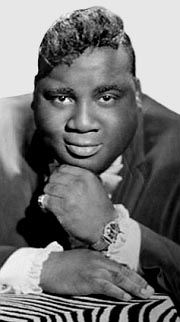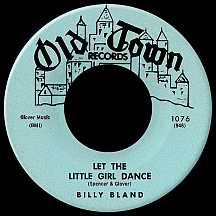BILLY BLAND
Let the Little Girl Dance
Dancing is part of growing up. Many songs have whimsically sought to describe the process of learning to dance, freeing oneself to step and sway in a predetermined way or free-form according to preference. Hank Ballard's (and Chubby Checker's) 'little sis' did "The Twist." Sam Cooke taught his girl how to 'cha cha cha' and before long admitted 'she was doing it better than me!' Gary (U.S.) Bonds' little lady said 'I don't know how to twist!,' so he showed her. Little Eva invited everyone to 'do the loco-motion with me.' Amongst all this body-shaking stimuli, Billy Bland focused two minutes of his time on a 'little wallflower' with '...the nerve to take a chance.' So stand back, everybody, and 'let the little girl dance!'
A native of Wilmington, North Carolina, Billy didn't wait any longer than necessary to achieve his goal of becoming a professional singer. Making the 600-mile trek northward to New York City at age 18, the talented and determined young singer immediately caught some breaks, landing a gig with Lionel Hampton's band, then another with Buddy Johnson in the late 1940s. But he developed a lack of discipline, a result, perhaps, of advancement coming too easily; as a result, he didn't hang onto any one job for very long. Billy was singing at Smalls Paradise in Harlem in 1954 when Dave Bartholomew spotted him, took him to his home base in New Orleans, and made him the lead singer of The Bees, whose "Toy Bell" was recorded at Cosimo Matassa's studio with Bartholomew producing and regular members of Fats Domino's band providing the rhythmic uptake. The record had limited success as many stations banned it for its double-entendre lyrics: 'I played with her yo-yo on the string...and she played with my ding-a-ling!' (Chuck Berry's live recording of the song became a number one hit in 1972 under the more obvious title "My Ding-A-Ling").
There was one other Bees single on Imperial before the group disbanded; Billy was on his own once again, having inadvertently recorded a future classic of dubious content. All the experience to this point helped land him a contract in 1956 as a solo artist with Old Town Records, a new York-based label founded three years earlier by Romanian immigrant and rhythm and blues aficionado Hy Weiss. His first two singles for the company were "chicken" songs, an unusual mutual theme, each having a vastly different sound. "Chicken in Basket" blatantly lifted Bo Diddley's signature beat (established with the hit "Bo Diddley" about a year earlier); the second poultry-centric disc, "Chicken Hop," is a pure blues number, pulled off with help from the premier blues duo, guitarist Brownie McGhee and harmonica player Sonny Terry, lending their Piedmont brand of rhythm to the proceedings. Bland, in fact, liked trying different things and during his seven years with Old Town his music ran the gamut from furiously-paced R&B to blues, pop ballads, doo wop and straight-ahead rock and roll.

The "chicken" songs didn't sell, even after being paired on a Tip Top label reissue several months later. Billy composed a lot of his own material, including "I Had a Dream," the heartfelt flip side of his next single. He made some recordings that weren't released and found himself in a state of limbo for a couple of years until a late 1959 session yielded his one major hit. Titus Turner (an R&B singer formerly with Okeh, King and other labels) was struggling with the Carl Spencer-Henry Glover tune "Let the Little Girl Dance" (the original version had been released a couple of years earlier by Carl Spencer and the Videos on Manhattan). Billy took a stab at it and nailed the song in one take, considering it no more than demonstration quality despite the stellar lineup of musicians who contributed to the track including saxophonist Buddy Lucas, guitarist Mickey Baker and backing singers The Miller Sisters (the R&B girl group known for "Hippety Ha" on Herald Records several years before). Turner never did have a record issued on Old Town (no need for concern; he kept going for many years on other labels), but Bland's quick take on "Let the Little Girl Dance" was just what Weiss and the writers had in mind. It debuted on the national charts in February 1960 and remained there through the end of June, settling into the top ten for four weeks in May.
Billy had three more records in 1960 that made the charts, if only briefly. "You Were Born to Be Loved" (written by Claude Demetrius) and its flip, Otis Blackwell's "Pardon Me," divided opinion among radio programmers as to which was the better track. "Harmony" (penned by Gene Pitney, who hadn't yet made his mark as a singer) was also strong but faltered. "Everything That Shines Ain't Gold" and "I Cross My Heart," both Billy Bland compositions, didn't chart. His best shot at a big second hit was another self-penned effort, "My Heart's on Fire," arguably his best recording; it reached the national charts in the summer of 1961 but didn't do much better than the other singles had.
Old Town stayed with the talented singer for two additional years and several more singles, among them another borderline novelty song about his favorite fowl, "Momma Stole the Chicken" ('...and she thought it was a duck!'), complete with Billy's best attempt at "clucking" sounds. His final Old Town 45, in 1963, was a remake of unrelated bigger-star Bobby "Blue" Bland's 1958 hit "Little Boy Blue." Furthering some people's confusion of the two, his dynamic performance, which rivals the brilliance of Bobby's original, uses the exact same lyrics: 'You used to call me Bobby...little boy blue...Bob-beee!!!' (when he could just as easily done it as 'Bil-leee!'). A curious choice, though nicely executed.
After leaving Old Town in 1963, Billy performed around town but didn't make records again until '65, when he laid down a few tracks for the St. Lawrence label of Chicago. "She's Already Married" (penned by Monk Higgins and Bessie Cook) put him right in the setting of the Windy City soul scene. Flip side "My Divorce" is more reminiscent of earlier singles; bearing an obvious similarity to Ernie K-Doe's '61 hit "Mother-In-Law," the song suggests Ernie's family dilemma didn't end very nicely. After a second St. Lawrence single, "I'm Sorry About That," Billy resumed performing in clubs before quitting the music business a few years later. In the 1980s he opened a restaurant in Harlem that specialized in good ol' down-home southern soul food. The juke box in the eatery contained several of his original Old Town 45s, a constant reminder, for Billy Bland and his patrons, of his eventful career as a singer.


